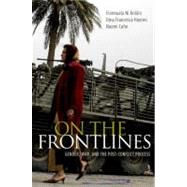
Note: Supplemental materials are not guaranteed with Rental or Used book purchases.
Purchase Benefits
What is included with this book?
| Acknowledgments | p. xi |
| Introduction | p. 3 |
| Key Threads and Themes | p. 7 |
| Gender Centrality | p. 10 |
| Relevant International Norms | p. 15 |
| Conflict and Its Dynamics | |
| Before, During, and After Conflict: The Connections for Women | p. 27 |
| Mapping the Status of Women Prior to Conflict | p. 28 |
| Some Relevant Measures | p. 31 |
| Gender, Law, and Social Capital | p. 34 |
| A Practical Assessment of the Before and After | p. 36 |
| Gender and the Forms and Experiences of Conflict | p. 40 |
| Women as Political and Military Actors | p. 42 |
| Violence, Women, and Victimization | p. 45 |
| Masculinities and Conflict | p. 49 |
| Conclusion | p. 55 |
| Toward Peace | |
| The Significance of Security: Realizing Peace | p. 59 |
| Is Gender Central to Security? | p. 61 |
| Security Reform and Transition | p. 62 |
| Critique of Mainstream Approaches to the Concept of Post-Conflict Security | p. 66 |
| Is Security the Same for Men and Women? | p. 67 |
| Security Reform Meets Pervasive Violence and Discrimination | p. 70 |
| A New Paradigm of Gendered Security | p. 74 |
| Conclusion | p. 79 |
| Engendering International Intervention | p. 81 |
| International Interventions | p. 83 |
| Types and Phases of Post-Conflict Intervention and Their Potential Gender Impact | p. 85 |
| The Actors | p. 89 |
| Toward Gender-Positive Intervention | p. 95 |
| Capturing and Retaining Gender Equity Achieved During War | p. 101 |
| Conclusion | p. 102 |
| Peacekeeping | p. 105 |
| Parameters and Status of Peacekeeping Missions | p. 106 |
| Identifying the Peacekeepers | p. 108 |
| Masculinities of Peacekeeping | p. 109 |
| Positive and Negative Lessons Learned from Peacekeeping Missions | p. 112 |
| Positives and Negatives of Employment and Economic Stimulus | p. 113 |
| Positives and Negatives Associated with Gender-Cultural Interactions | p. 114 |
| Sexual Violence and Peacekeeping Missions | p. 115 |
| What Would Gender-Positive Peacekeeping Encompass? | p. 117 |
| Legal Accountability | p. 118 |
| Training for Peacekeepers | p. 122 |
| Codes of Conduct | p. 125 |
| Added Gender Roles in Peacekeeping | p. 127 |
| Conclusion | p. 129 |
| Disarmament, Demobilization, and Reintegration (DDR) Programs | p. 131 |
| DDR Programs: What Happens? | p. 132 |
| The Power of Gender and DDR | p. 133 |
| Deconstructing DDR Programs | p. 136 |
| Reconstructing DDR Programs | p. 138 |
| Special Accommodations for Women and Girls | p. 142 |
| Attention to Masculinities | p. 144 |
| The Ways Forward | p. 148 |
| Conclusion | p. 150 |
| International and Local Criminal Accountability for Gendered Violence | p. 152 |
| Sex-Based Violence and Accountability in International Law | p. 153 |
| The Legal Journey to Codify Gendered Crimes in Armed Conflicts | p. 156 |
| Evidentiary Rules and Sexual Violence | p. 164 |
| Other Accountability Mechanisms-Restorative Justice and Other Practices | p. 168 |
| Conclusion | p. 172 |
| Remedies | p. 175 |
| Truth Processes | p. 176 |
| The Gendered Dimensions of Truth Recovery | p. 179 |
| How Can Truth Recovery Mechanisms Centralize Gender? | p. 185 |
| Reparations | p. 186 |
| Lustration, Vetting, and Gender | p. 192 |
| Conclusion | p. 195 |
| Law Reform, Constitutional Design, and Gender | p. 197 |
| Gender and the Rule of Law in Post-Conflict Societies | p. 199 |
| Constitutional Transformation and Post-Conflict Processes | p. 204 |
| Process: Peace Agreements as Constitutional Documents | p. 205 |
| Peace Agreements, Constitutions, and Customary Law | p. 210 |
| Gendered Dimensions of Constitution Drafting in Implementation Agreements | p. 212 |
| Constitutional Gender Centrality-Substance and Export | p. 215 |
| Reproductive Rights | p. 219 |
| Conclusion | p. 222 |
| Reconstruction and Development | |
| Gender and Governance | p. 229 |
| Post-Conflict Governance | p. 231 |
| The Gendered Components of Post-Conflict Governance Programs | p. 232 |
| Institution Building | p. 241 |
| Governance Conflated with Economic Reconstruction and Democratization | p. 244 |
| Gendering Governance | p. 249 |
| Conclusion | p. 253 |
| Development Infrastructure: Economics, Health, and Education | p. 254 |
| The Differing Directions of Post-Conflict and Development Fields | p. 256 |
| Gender Centrality in Development | p. 259 |
| Social Services Justice as the Integration of Post-Conflict Processes and Development | p. 262 |
| Long-Term Development | p. 267 |
| Conclusion | p. 271 |
| Notes | p. 273 |
| Index | p. 347 |
| Table of Contents provided by Ingram. All Rights Reserved. |
The New copy of this book will include any supplemental materials advertised. Please check the title of the book to determine if it should include any access cards, study guides, lab manuals, CDs, etc.
The Used, Rental and eBook copies of this book are not guaranteed to include any supplemental materials. Typically, only the book itself is included. This is true even if the title states it includes any access cards, study guides, lab manuals, CDs, etc.